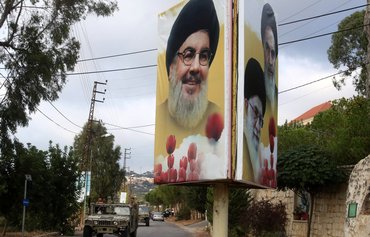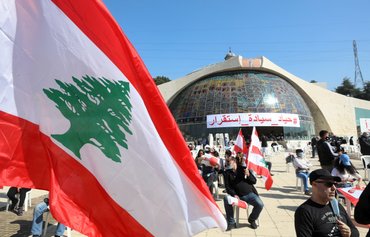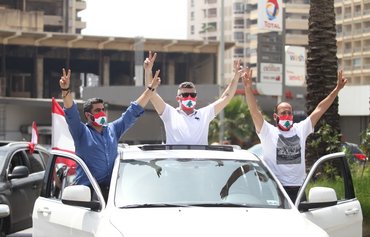Renewed protests in Lebanon fueled by the country's economic free-fall have this week seen demonstrators openly calling for Hizbullah to disarm, protestors and political activists told Al-Mashareq.
As the country tries to chart its course out of a crippling economic crisis, Hizbullah's ties to the Iranian regime have left the government with few options to access aid, which has in turn fueled public anger against the militia.
After a pause necessitated by the novel coronavirus (COVID-19) lockdown, protests that kicked off in October against government corruption, triggered by rising unemployment and poverty, started up again on June 6th.
On Thursday (June 11th), protests broke out once more across the country, as the Lebanese pound sank to a record low on the black market, AFP reported.
Prime Minister Hassan Diab on Friday chaired an "urgent" cabinet meeting to address the situation, with the Central Bank governor and representatives of the banking association and money changing syndicate in attendance.
A syndicate spokesman said the central bank had agreed to "inject dollars" into the market, hoping to reverse the decline in the pound's unofficial exchange rate.
During the June 6th protests, demonstrators chanted slogans that called for disarming Hizbullah, and clashes erupted between supporters and opponents of the Iran-backed Lebanese militia.
Soldiers formed a human chain separating the two sides after supporters and opponents of Hizbullah threw stones at each other.
"When I decided to participate in the demonstration, I knew that Hizbullah would send its supporters to instigate a confrontation with us," protestor Adnan Salman told Al-Mashareq.
Hizbullah seeks to silence voices that call on it to disarm, he said.
"On the eve of the demonstration, I saw how they roused their supporters, saying the demonstration is targeting their weapons and intimating that they will take to the streets and confront us," Salman said.
"I was not surprised when clashes broke out in more than one area in Beirut between the demonstrators and the party's supporters and people behind them who planned to foil our [protests]," he added.
Hizbullah is the only group to have kept its weapons since the end of the Lebanese civil war, deeply dividing Lebanon along political lines.
Calls for disarming Hizbullah
The resumption of activism is expected, as is the opposition of groups such as Hizbullah, researcher and political activist Luqman Salim told Al-Mashareq.
Calls for disarming Hizbullah escalated during the intrastate conflict of 2008, and gained steam after the Iran-backed militia intervened in the Syrian conflict in support of the regime, he said.
When protests broke out on October 17th, "demands also were made that the party be stripped of its weapons" in compliance with international law, he said.
Lebanon cannot be governed by two states, especially during the economic collapse, Salim said, noting that Hizbullah's "illegal weapons are a tool of hegemony, expropriation, smuggling and enforcing a foreign policy on Lebanon".
The reason for the economic collapse, he noted, "is the failure to implement UN Security Council resolutions 1559, 1680 and 1701", which call for the disbanding and disarmament of all Lebanese and non-Lebanese militias.
Conditions were ripe for the resumption of popular protests, as unemployment has risen steeply and purchasing power has diminished, writer and political activist Hanna Saleh told Al-Mashareq.
Protestors from all sectors of society have demanded an end to government corruption and called for Hizbullah to be stripped of its weapons, he said.
"The overwhelming majority of Lebanese are motivated by their pain and not sectarian base instincts," he added.
Only state may possess arms
The protests have regained momentum despite previous attempts to stamp them out, activist Richard Chamoun told Al-Mashareq.
Clashes between the demonstrators and Hizbullah supporters have become commonplace, he said, noting that militiamen have stormed public squares and attacked those holding banners calling on the militia to disarm.
"What is the problem with raising the slogan calling for disarming Hizbullah?" Chamoun said. "When we say 'All of them means all of them', Hizbullah and its weapons are included."
"We are calling for a state of law, constitution and institutions," he said, pointing out that the constitution prohibits Hizbullah or any other Lebanese group from bearing arms.
The Taif Agreement was enshrined in the constitution, he said, and international resolutions also stipulate that only the Lebanese state may possess weapons.
Calls for disarming Hizbullah are natural, he added, as evidenced by the party's corruption, which includes its control of illegal crossings to Syria and its facilitation of cross-border smuggling activities.

![Lebanese riot police stand guard in front of protestors during a demonstration in central Beirut, on June 6th. Protestors poured into the streets of the Lebanese capital to decry the collapse of the economy, as clashes erupted between supporters and opponents of the Iran-backed militia Hizbullah. [Patrick Baz/AFP]](/cnmi_am/images/2020/06/12/24495-Lebanon-Beirut-protest-600_384.jpg)






